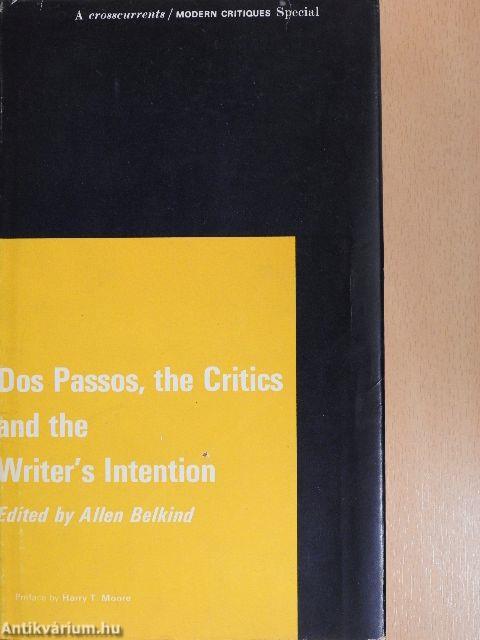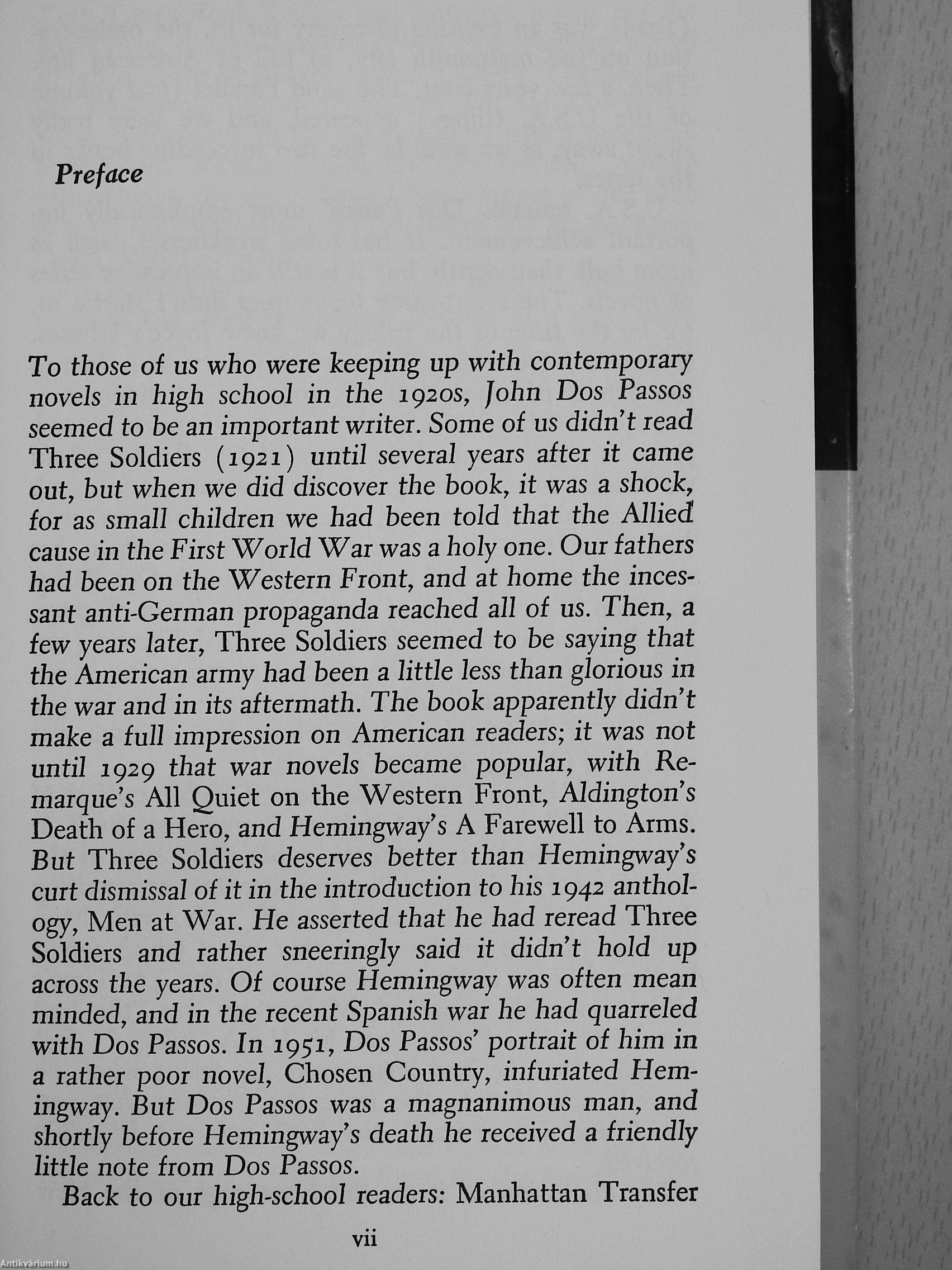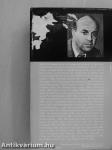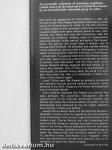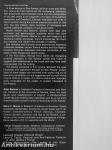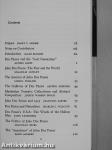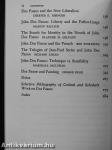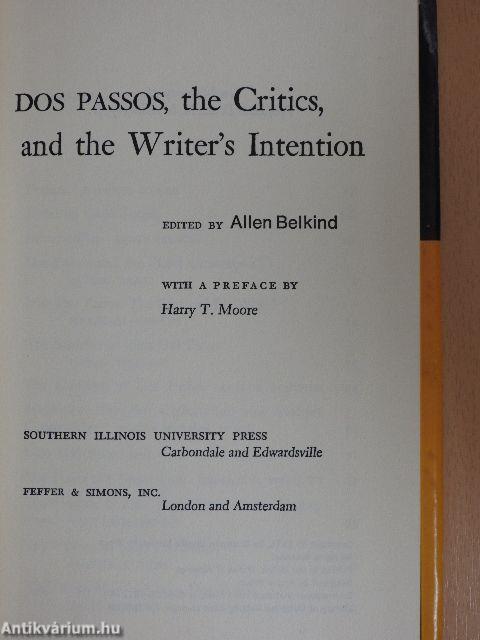1.104.175
kiadvánnyal nyújtjuk Magyarország legnagyobb antikvár könyv-kínálatát

VISSZA
A TETEJÉRE
JAVASLATOKÉszre-
vételek
DOS PASSOS, the Critics, and the Writer's Intention
| Kiadó: | Southern Illinois University Press-Feffer & Simons, Inc. |
|---|---|
| Kiadás helye: | Carbondale-London |
| Kiadás éve: | |
| Kötés típusa: | Vászon |
| Oldalszám: | 288 oldal |
| Sorozatcím: | Crosscurrents-Modern Critiques |
| Kötetszám: | |
| Nyelv: | Angol |
| Méret: | 21 cm x 13 cm |
| ISBN: | |
| Megjegyzés: | További kapcsolódó személyek a könyvben. |
naponta értesítjük a beérkező friss
kiadványokról
naponta értesítjük a beérkező friss
kiadványokról
Előszó
TovábbFülszöveg
John Dos Passos, born in ChiTirago on January 14,1896, has been labeled at various times a "proletarian" writer,,.a romantic, a determmist, a realist, a naturalist, a moralist, a social critic, a coilectivist, an.individualist, a satirist, and a reactionary. His first noveL One Man's Inliiaffon lished in 1920. This was followed by Thr^ Rosinante to the Road Again (travel essa^ at the Curb (verse), 1922; Streets of NrgfM, 1The Garbage Man (play), 1 press, 1927; and Airways, Inc. (ptny), Durmg t when he reached his greater acclaimpublished were The 42nd Parallel, 1330; 1919, t^; Fortune Heig 1933; In All Countries ami Three Plays, ^934\ The Big Mone 1936; U.S.A. (colleoted edition) and Journeys Between Wars, 1938: and AcivgMhPBs ofa Young Man, 1939. His other
published Ground We Stand On, 1941;
Number the Natkrn, 1^44; Tour of Duty,
1946; The ^aPH^QHí949; The Prospect Before Us, 1950; Columbia (col-
Thomas Jef-
f.ex^^tné- Theme is
i/^Dm, 1956;
Gj^i pays, 195B; Age, 1959; Mid-... Tovább
Fülszöveg
John Dos Passos, born in ChiTirago on January 14,1896, has been labeled at various times a "proletarian" writer,,.a romantic, a determmist, a realist, a naturalist, a moralist, a social critic, a coilectivist, an.individualist, a satirist, and a reactionary. His first noveL One Man's Inliiaffon lished in 1920. This was followed by Thr^ Rosinante to the Road Again (travel essa^ at the Curb (verse), 1922; Streets of NrgfM, 1The Garbage Man (play), 1 press, 1927; and Airways, Inc. (ptny), Durmg t when he reached his greater acclaimpublished were The 42nd Parallel, 1330; 1919, t^; Fortune Heig 1933; In All Countries ami Three Plays, ^934\ The Big Mone 1936; U.S.A. (colleoted edition) and Journeys Between Wars, 1938: and AcivgMhPBs ofa Young Man, 1939. His other
published Ground We Stand On, 1941;
Number the Natkrn, 1^44; Tour of Duty,
1946; The ^aPH^QHí949; The Prospect Before Us, 1950; Columbia (col-
Thomas Jef-
f.ex^^tné- Theme is
i/^Dm, 1956;
Gj^i pays, 195B; Age, 1959; Mid-
certft/T^feei; Mr. the Move,
1963; Oc^s^ions ató Prot^,^^: Tfjg^^^les of Pi^^dThe Besi Tfn^m^i The Pmtü^í áfdry, 1969; and Es^íísland, 1971. D^Sassas di^ in;1970.
' 7 ¦ 'mi
n üns Pffssos courtesy of The Betlmann Archive
An invaluable collection of seventeen significant critical essays on the mind and art of John Dos Passos by an internationally renowned group of critics
Ever since the appearance of Three Soldiers in 1921, tlie writings of Joiin Dos Passos have been subjected to a wide variety of interpretations by critics, in this first collection of critical essays on him, seventeen critics have contributed valuable insights from many different points of view. Alien Bell<ind, who edited and wrote the Introduction, sees this collection as revealing "existing areas of disagreement about the intention, mode, method, and style of Dos Passos' fiction, the political and social ideas it reflects, and its sources and influences. He evaluates and clarifies existing critical differences, and provides a bibliography to aid the reader in locating other important criticisms on Dos Passos.
Alfred Kazin, in a general treatment of Dos Passos' career up to 1941, sees his worl< as a direct iinl< between the fiction of postwar "Lost Generation" and the crisis novel of the thirties. i\/1aicolm Cowley suggests that Dos Passos is "in reality two novelists. One of them is a late-Romantic, an individualist, an esthete moving about the worid in a portable ivory tower; the other is a coiiectivist, a radical historian of the class struggle."
Lionel Trilling sees Dos Passos as primarily concerned with personal morality and the national, collective, social elements of his U.S.A. trilogy as a brilliantly delineated setting for his moral interest.
Arthur Mizener interprets Dos Passos as a satirist who takes seriously "the anarchistic individualism and the egalitarianism of the American democratic tradition and attacks with satire the institutionalized corruption and the disintegrated lives produced by the two mighty opposites of our society-industry and politics."
Joseph Warren Beach deals with the technical devices In Manhattan Transfer which he regards as the first collective novel in American fiction and an original contribution to the modern novel. Charles Walcutt and John Lydenberg both posit that Dos Passos is strongly naturalistic and deterministic in his writing. Walcutt attempts to link him with other American naturalists; Lydenberg explores discrepancies between the deterministic and moralistic aspects of U.S.A. To Jean-Paul Sartre, Dos Passos is an "engaged" writer who uses deterministic devices and distortion only to accomplish his social and moral purpose.
Continued on back flap
Continued from front flap
In three essays on Dos Passos' political views and affiliation, Granville Hicks points out his unchanging individualistic philosophy, David Sanders notes that the conservatism of his later years is an outgrowth of a basic philosophical anarchism, and Chester E. Eisinger Illustrates how shifts in liberal politics during the thirties affected the views of men who, like Dos Passos, were skeptical of Ideologies and upheld traditional concepts of self-government.
Martin Kallich and Blanche Gelfant both deal with emotional and psychological problems which may have influenced Dos Passos' attacks on real and imaginary authoritarian power structures. Kallich emphasizes the Oedipus complex and Gelfant the problem of identity.
Ben Stoltzfus and Richard Lehan examine the reciprocal influences between certain French writers and Dos Passos. Marshal] McLuhan discusses technical similarities in the styles of Dos Passos and James Joyce.
In the final essay, George Knox points out interesting pictorial analogies In Dos Passos' poetry and fiction to suggest that experiences in the visual arts may have been incorporated into his writing.
The essays contained in this volume represent the most influential and significant thought on Dos Passos' career. Many of these essays are reprinted from works long out of print and unavailable, or from magazines and journals which may be difficult to locate. It is thus a unique and important work, invaluable for the reader or student interested in Dos Passos.
Allen Belkind is Assistant Professor of American and Modern Literature at the University of Nevada, Reno. His book Sartre (and existentialism) in English: A Bibliographical Guide has just recently been published, and he is currently at work on both a checklist and a critical study of Dos Passos.
Harry T, Moore is Research Professor at Southern Illinois University, Carbondale. Among his recent books are E. M. Forster, Twentieth-Century French Literature, Twentieth-Century German Literature, and Age of the Modern, a collection of his critical analyses and miscellaneous writings. He is coauthor of D. H. Lawrence and His World.
Other Crosscurrents / Modern Critiques of Interest For a complete list of Crosscurrents titles, please write to Southern Illinois University Press, Carbondale, Illinois 62901.
Leonard Kriegel. Edmund Wilson
Larry E. Taylor. Pastoral and Anti-Pastoral Patterns
in John Updike's Fiction William Wasserstrom. The Legacy of Van Wyck Brooks: A Study of Maladies and Motives Vissza
Témakörök
- Irodalomtörténet > Írókról, költőkről
- Idegennyelv > Idegennyelvű könyvek > Angol > Irodalomtörténet
- Irodalomtörténet > Világirodalom > Amerikai irodalom > Észak-amerikai
- Irodalomtörténet > Irodalomtudomány > Tanulmány, tanulmánykötet
- Irodalomtörténet > Irodalomtudomány > Publicisztika
- Irodalomtörténet > Irodalomtudomány > Korszakok > 20. századi
- Irodalomtörténet > Irodalomelmélet > Irodalomesztétika
- Irodalomtörténet > Irodalomelmélet > Irodalomkritika



